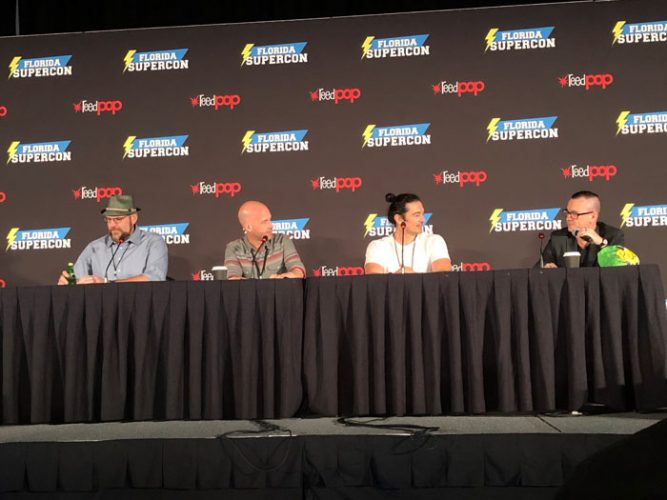

We all have our favorite voice actors, but actually getting into the profession can be confusing and difficult. Fortunately, there was a voice acting for video games panel where voice actors Steve J. Palmer, Bret Iwan, and Adam Croasdell talked about their profession and answered some questions about voice acting from the audience. The idea is to give the audience some insight into the career of voice acting. Take a look at what they discussed during the panel!
Get to Know the Voice Actors
Steve J. Palmer is best known for his role as the outlawBill Williamson in RED DEAD REDEMPTION and RED DEAD REDEMPTION 2. Bret Iwan is the current official voice of Mickey Mouse and voiced him in hit game series such as KINGDOM HEARTS starting with KINGDOM HEARTS: BIRTH BY SLEEP. Adam Croasdell is a well-known actor, but is most well-known in the voice acting world for portraying Ignis Scientia in FINAL FANTASY XV. Steve J. Palmer started his voice acting career for video games back in 2008. He tells about how he went into the audition only knowing that it was for a role in a Western video game, which he thought was “great.” Months passed and it wasn’t until after the new year that he finally got a callback and excitedly accepted his first role. He jokes that “the rest was history.” Bret Iwan, the voice of Mickey Mouse, didn’t start getting into video games until a couple of years into his career. After listening to Palmer’s recantation of his first audition, he jokes that for his audition he “put on red shorts and took [his] shirt off” for his first audition. He had actually planned on being an illustrator for his full-time job, but after years of practicing his “Mickey voice” for friends and family, he knew he couldn’t pass up the opportunity to professionally voice Mickey Mouse when the audition call came up. After years of doing the voice for shows and toys, he finally got started voice acting for video games. Adam Croasdell was doing shows and got a call from Kate Saxon to audition for a video game she was doing. He was in London at the time and thought, “Sure, why not?” After sitting down to do a read-through, he found that he really enjoyed it and got cast for the part.
Memorable Auditions
Every voice actor has those few memorable auditions and one of the panel shared one of those memories with the audience. Steve J. Palmer tells about his first Western video game audition where the studio had a table full of props and he was told to use those props while going through his lines, as if he were truly acting it out live, like in a movie. He was told to do things like pretend the chair was a boulder and shoot towards the bad guys. “It was the most fun and memorable audition I’ve ever had in my experience,” he said. Back then, using props during an audition was “a bit of a no-no” he said, so it was truly a unique and great experience.
You Don’t Perform Each Game the Same Way
One thing all three of our panelists agreed on was that each game is different. Bret Iwan recalls how Kingdom Hearts 3 was the first time the lip-flap was re-animated for the English game, which made it immensely easier to record Mickey’s lines. However, he didn’t always get to know where the story was going, so there was some improvising going on as well. He also mentions that Mickey never dies in the game or has very many lines, so it was fun figuring out the different sounds Mickey would make if he fell 50 feet versus five feet. Steve J. Palmer also mentions that while some games you’ll do recordings a few weeks on and a few weeks off for a year, he basically had to record Red Dead Redemption 2 in secret for five years. Since it was shot in secret, nothing was really in chronological order, which added another dimension of difficulty. Adam Croasdell echoes his fellow panelists, saying that you had ever get the material ahead of time since there’s always changes going on right up to the day you start recording. He recommends that aspiring voice actors need to learn how to “lean into” their character’s voice. Recordings can go for hours and days at a time, so you have to be able to keep up that character’s voice and all the different nuances for prolonged periods of time.
Final Thoughts
Unfortunately, there wasn’t a lot of time for Q&A after! Hopefully, our panelists gave you some good insight into the world of video game voice acting and how to start. We at Honey’s believe the takeaway is to just *start*. Whether it be doing research, practicing, or getting involved in something local, we all have access to cameras or know someone who does, which means none of us have an excuse not to go out there and start creating. There are tons of games out there that need voices! Is there anything that our panelists didn’t get asked that you would’ve liked to have asked? Was there anything that particularly resonated with you? Let us know in the comments below!
Add Comments